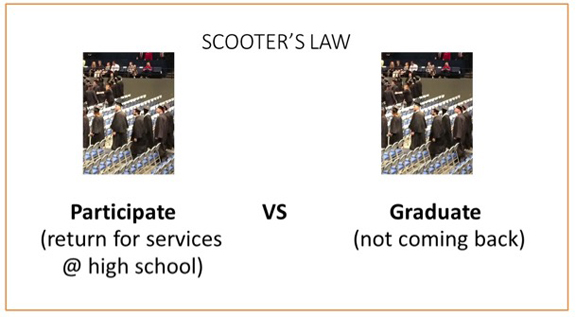
It is important to understand there is a difference between participating in the graduation ceremony vs. actually graduating from high school. Parents are often confused by this. If your child is returning for services next year, your child has NOT graduated yet.
Thanks to Scooters Law, students with disabilities have an option of when they can participate in the graduation ceremony. Therefore in the 11th or 12th grade IEP meeting, often you will see the “graduation” box checked on the IEP invitation. This often scares families.
Yet, schools are required to discuss “graduation” after a student has attended a high school for four years. The law allows students in special education to:
- participate in graduation ceremonies with their same age peers (or those with whom they started high school) and then return for services; OR
- “walk” in the graduation ceremony when your child officially graduates from high school and no longer receives special education services.
Your child can only participate in ONE graduation ceremony. So students and families must think about which situation fits their needs. The school will document your decision within the IEP.
It is important if your child plans to participate in graduation ceremonies after his or her fourth year of high school and then return for special education services, the IEP paperwork should clearly state that the student is “participating in graduation ceremonies.” The paperwork should not say that the student is “graduating with a diploma” unless you are certain that he or she will not be returning for special education services.
Many parents think their children with disabilities are required to stay in school until age 21. Remember the reason a student stays in school after 4 years of high school should be based on a “need” for special education or related services to complete their Individualized Education Program. The need should be determined by the ARD Committee, which includes your child and you, and should be based on data or evaluations.
Also, remember to consider your child’s desire to stay or graduate when making decisions. Balance those with any opportunities that are available in the community. Sometimes your child may benefit more from moving on to adult life.
So remember – If your child just returns to school next year for services, they have not graduated yet!
Additional Resources:
TEA/OCCRRC – Scooter\’s Law
Legal Framework for the Child Centered Process – Graduation
Transition Planning
Graduation Programs
Graduation Options
Graduate by IEP




